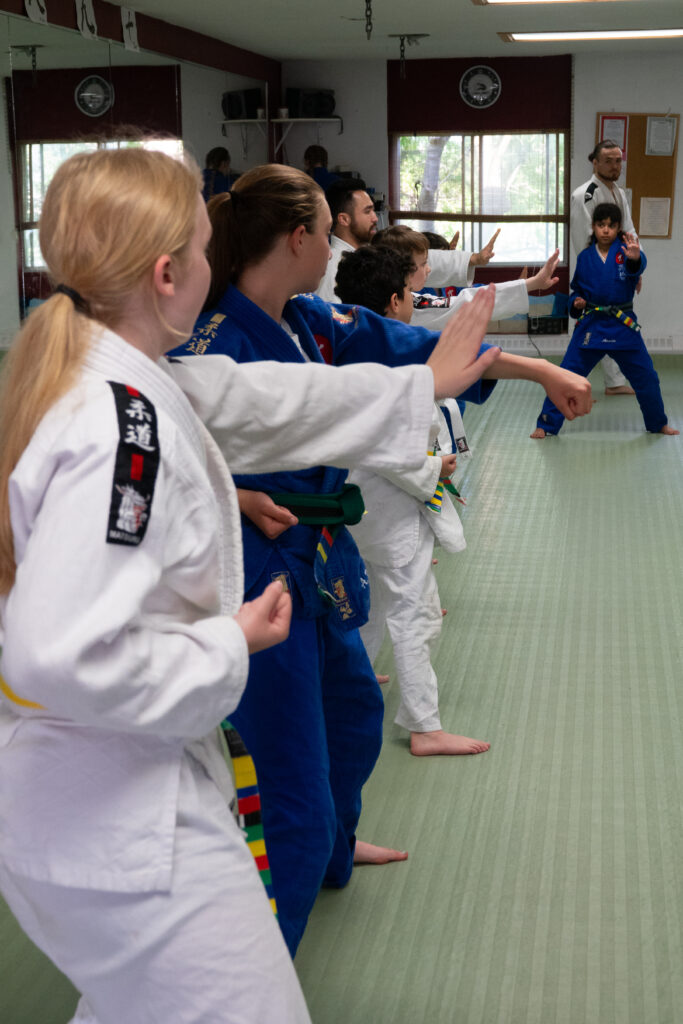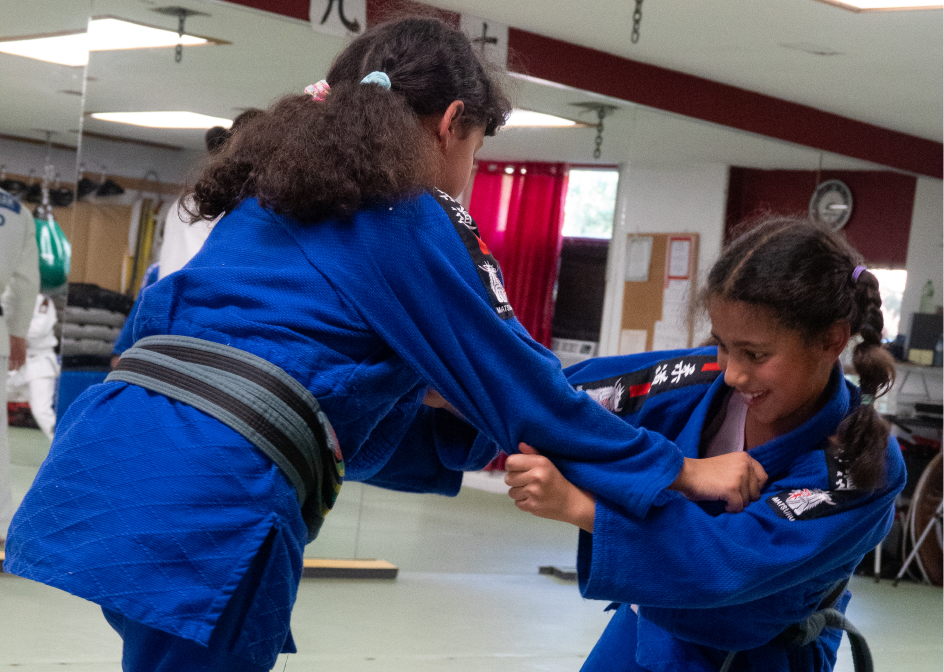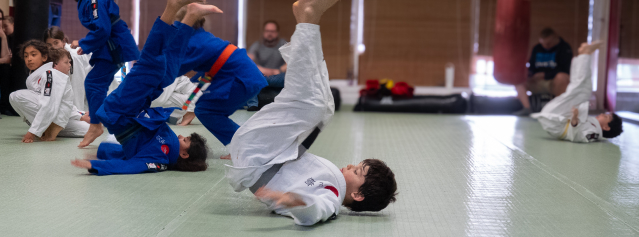Menu
Close
Menu
Close

Judo offers a unique blend of physical activity and life skills that is important for kids. Engaging in judo helps children develop discipline, confidence, and resilience while promoting a healthy lifestyle. As we explore the benefits of this gentle martial art, it becomes clear how judo not only teaches self-defence but also fosters social skills and respect among peers.
Through judo, our children learn to channel their energy positively and cultivate essential traits such as patience and sportsmanship. This martial art encourages teamwork and cooperation, providing a solid foundation for the development of strong relationships in and out of the dojo.
In our journey to understand the importance of judo for kids, we will uncover its many advantages, from its educational philosophy to its role in enhancing physical and mental health.
Judo goes beyond physical training; it integrates valuable life lessons through a unique educational philosophy. We can see how discipline and respect play crucial roles, along with an emphasis on character development. The principles set by Jigoro Kano further shape this philosophy, guiding children through their judo experience.
In our judo practice, we emphasize the importance of discipline and respect. Every class begins and ends with a bow, teaching children to honour their instructors and fellow students. This simple act fosters an understanding of respect that extends beyond the dojo.
Through the structured environment of judo, kids learn to follow rules and routines. They must focus during training, which builds self-control and discipline. These qualities are essential for personal growth, helping children manage their behaviour in various settings.
Discipline in judo also translates to homework and personal responsibilities. As kids learn to commit to their training, they understand the value of consistency and hard work in all aspects of life.
Character development is another key aspect of judo. In our classes, we cultivate traits like perseverance and teamwork. We encourage children to push through challenges, helping them build resilience.
Judo also promotes teamwork. When children spar or practice techniques, they learn to support each other. This collaboration fosters friendships and a sense of belonging, which is vital for social development.
Through these experiences, kids grasp the importance of kindness and empathy. They learn to respect differences and encourage peers, which contributes to their growth into well-rounded individuals.
Jigoro Kano, the founder of judo, emphasized principles that shape our educational philosophy. His teachings focus on mutual welfare and benefit, which we incorporate into our training.
Kano’s idea of “maximum efficiency, minimum effort” encourages children to think critically about their actions in judo. Instead of relying solely on strength, they learn to use technique and strategy. This approach sharpens their problem-solving skills.
Moreover, Kano believed that judo should be a means for personal development. His philosophy encourages us to create an environment where learning extends beyond physical skills. By applying Kano’s principles, we aim to instil life lessons that enhance character, respect, and discipline for years to come.
Engaging in judo offers numerous physical and mental benefits for children. Through regular training, kids enhance their physical fitness and develop essential life skills. Let’s explore how judo can help in these areas.
Judo is an excellent way to improve physical fitness. It promotes strength, flexibility, balance, and coordination. Children learn to use their bodies effectively through various techniques, leading to better overall health.
Regular judo practice provides a form of exercise that can help combat childhood obesity. It encourages cardiovascular health and muscle development. Kids build endurance as they practice throws and holds, which are integral to the sport.
Moreover, judo helps in developing body awareness. Understanding how to move their bodies in space enhances their physical development. This awareness is crucial for preventing injuries in other sports and activities.
Judo requires sharp mental focus and concentration. During classes, children must pay attention to their instructors, follow complex movements, and respond quickly to opponents. This mental engagement helps enhance cognitive skills.
As they learn judo, kids face challenges that require problem-solving and strategic thinking. This builds their ability to concentrate, both on and off the mat. Improved mental focus can translate to better performance in school and other activities.
Practicing judo also teaches children to stay calm under pressure. This skill is valuable in life situations, helping them develop resilience and a strong mindset.
Judo training significantly boosts self-confidence and self-esteem. As children learn new techniques, they experience a sense of achievement. This accomplishment fosters a positive self-image.
Moreover, judo emphasizes respect and courtesy, both to peers and instructors. This creates a supportive environment where children feel valued. By mastering skills and earning belts, they gain recognition for their hard work.
We see that engaging in judo helps children understand their strengths. This understanding reinforces their self-worth and encourages them to take on new challenges. Through judo, children learn that effort leads to success and builds confidence in all areas of life.
Judo provides essential skills that help children protect themselves in various situations. Through learning specific techniques and safety measures, we equip children with valuable self-defence skills that can boost their confidence and ability to handle challenges.
In judo, we focus on key self-defence techniques that allow our children to respond effectively during confrontations. We teach them how to use an opponent’s force against them, which is a fundamental principle of judo.
Kids learn movements such as throws and holds that can neutralize an attacker without relying on brute strength. This skill is vital, especially for smaller or less experienced children. By practicing judo regularly, they gain confidence in their ability to defend themselves in real-life situations.
Understanding these techniques also helps foster awareness about their surroundings, making them more attentive to potential threats. Training in judo not only hones physical capabilities but also develops mental resilience in our children.
A critical aspect of judo is ukemi, or the art of falling safely. We prioritize ukemi because it teaches our children how to protect themselves when they fall. Learning to land safely can prevent injuries during training and in everyday life.
During ukemi practice, kids develop reflexes to roll or fall without getting hurt. This ability is essential, especially when they need to escape from grasping situations or unexpected tumbles.
By regularly practicing ukemi, we help them build body awareness and confidence. Knowing how to fall properly can also reduce the risk of injuries in other sports or activities.
Judo plays an important role in addressing bullying. We provide a safe and supportive environment for our children to build self-defence skills that can deter bullies.
As they progress in judo, kids gain self-esteem and assertiveness, making them less vulnerable to bullying. They learn not only how to defend themselves physically but also how to handle confrontations with confidence and calmness.
Through discussions and role-playing during classes, we encourage open communication about bullying. This approach helps our children understand the importance of seeking help and standing up for themselves and others.
Engaging in judo provides kids with significant opportunities for social interaction and personal growth. As they practice together, they not only enhance their physical abilities but also build essential social skills and learn valuable lessons about teamwork and respect.
In judo, children interact closely with their peers during training sessions. This environment promotes camaraderie and encourages lasting friendships.
By practicing techniques and sparring with partners, kids learn to communicate effectively. They develop trust as they rely on one another for safety and support.
These moments foster social interaction that transcends the dojo, leading to stronger connections both inside and outside of the sport. As children share experiences and work towards common goals, they cultivate a sense of belonging.
While judo is often viewed as an individual sport, it emphasizes the importance of teamwork. During training, participants frequently work with partners, which strengthens their ability to cooperate.
Through judo, kids learn valuable social skills like listening, patience, and effective communication. These skills aid conflict resolution and interaction with others.
As they progress, they celebrate each other’s successes, promoting a supportive atmosphere. This teamwork not only benefits their judo practice but also prepares them for challenges in school and life, where collaboration is vital.
In judo, each child’s achievements are celebrated, whether it’s mastering a new throw or successfully competing in a tournament. This fosters a sense of pride and accomplishment.
Recognizing individual progress contributes to self-control and resilience as kids learn to set and achieve personal goals. At the same time, they experience how individual efforts contribute to the success of the team.
By blending individual achievements with collaborative experiences, judo teaches kids that everyone has a role to play. This understanding helps them appreciate both personal and group contributions, creating a holistic approach to growth and development.
Will will address common questions about judo for kids, covering the benefits to physical, mental, and emotional growth, safety practices, age appropriateness, and how judo can help in school and develop essential life skills.
How can practicing judo benefit a child’s physical development?
Practicing judo enhances a child’s physical development in several ways. It improves strength, flexibility, and coordination through various techniques and movements. The sport also promotes cardiovascular fitness, helping children develop endurance while engaging in enjoyable physical activity.
What are the mental and emotional advantages of judo training for children?
Judo training offers many mental and emotional benefits. It helps children build self-confidence as they learn new skills and achieve goals. Additionally, judo teaches focus and concentration, which can improve attention span and resilience when facing challenges both on and off the mat.
At what age is it appropriate for children to begin learning judo?
Children can start learning judo as early as age 4. At this age, they can grasp basic techniques and participate in fun activities that introduce them to the sport’s fundamentals. As they grow older, their training can become more structured and focused on skill development.
How does learning judo at a young age influence a child’s discipline and respect?
Learning judo instills discipline and respect in children from an early age. The art emphasizes courtesy and humility, teaching children to respect their instructors and fellow students. By committing to regular practice and following dojo etiquette, children learn the value of hard work and accountability.
What safety measures are in place when children practice judo?
Safety is a top priority in judo training for children. Instructors ensure that the training environment is supervised and safe, with mats used to cushion falls along with sprung floors. Additionally, children learn proper techniques to minimize the risk of injury, and the emphasis on control during practice helps maintain a safe atmosphere.
In what ways can judo contribute to a child’s success in a school environment?
Judo can positively influence academic success by reinforcing essential skills such as discipline, focus, and teamwork. Children who train in judo often show improved attention in class and better social skills through working with peers. These attributes can lead to better performance and relationships in a school setting.
Anyone interested in participating in Judo for Kids may reach out to:



Hours of Operation:
Monday – Friday
8:00 a.m. – 8:00 p.m.
Saturday – Open Mats
2:00 p.m. – 3:00 p.m.
Recent Posts
Blog
How Martial Arts Teach Children Anti-Bullying Skills: Building Confidence and Self-Defence
10 Benefits of Martial Arts Training for All Ages: Physical and Mental Advantages for Everyone
How to Choose the Right Martial Art for You: Finding Your Perfect Fighting Style
5 Reasons Martial Arts Help Children Build Confidence: Developing Self-Belief Through Discipline
Copyright © 2024 |
Tina Takahashi Martial Arts
Designed by
ElissDesign.com





